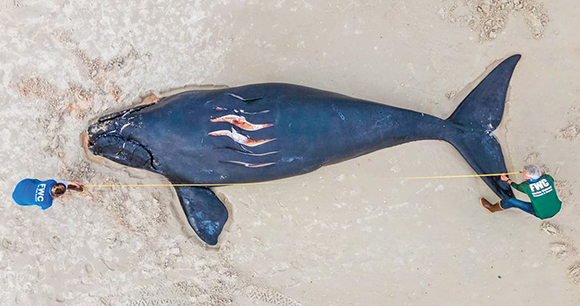Legislators Float Wrong Moves on Right Whales
Vessel strikes continue to be one of the leading threats facing critically endangered North Atlantic right whales (NARW). Slowing down vessels is the only proven way to avoid these deadly strikes: Reducing vessel speeds to 10 knots has been shown to decrease risk of NARW death by more than 80 percent.

Currently, a National Oceanic and Atmospheric Administration vessel speed rule requires vessels 65 feet in length or greater to travel at 10 knots or less in specific areas and during specific times of year to avoid lethal vessel strikes. NOAA is proposing to amend this rule to cover broader geographic areas and times, determined by NARW calving season, and to apply the rule to vessels 35 feet in length or greater. Three of the four known vessel strike events involving mothers and calves since 2020 involved vessels between 35 and 65 feet long.
However, several measures introduced in Congress—including S 1833 by Sens. Joe Manchin (D-WV) and John Boozman (R-AR), HR 4323 by Rep. Earl L. “Buddy” Carter (R-GA), and an amendment to the National Defense Authorization Act (NDAA) by Rep. Jeff Van Drew (R-NJ)—seek to prevent the speed rule from being amended until monitoring technologies are available to help reduce vessel strike risks in near-real time, presumably lessening the need for speed restrictions. However, such technologies and related protocols capable of sufficiently mitigating vessel strike risk do not yet exist. Moreover, last year’s authorization by Congress to advance these technologies went unfunded, meaning we are still years away from implementation.
Fighting these measures and advancing the rule is one of our top priorities for the 118th Congress. In early July, AWI and over 40 animal welfare and environmental groups worked hard to stop the Van Drew amendment from being included in the NDAA. While this was an immense win, continued efforts in Congress to block speed limits in NARW habitat portend stormy seas ahead before the final rulemaking.
Program Terms: Marine Wildlife
AWI Quarterly Terms: Government/Legal, Quick Read
Related News
North American Environmental Commission Confirms Mexico’s Role in Imperiling Vaquita
In Program: Marine WildlifeA commission under the United States-Mexico-Canada Trade Agreement (USMCA) released a report yesterday confirming that Mexico’s unwillingness to enforce its own wildlife protection, trade, and fisheries laws...
Captive dolphins face uncertain futures. They deserve better
In Program: Marine WildlifeIn this op-ed for the Tampa Bay Times, Dr. Naomi Rose, AWI’s senior scientist in marine mammal biology, discusses the challenges in caring for orcas...
Yahoo! Japan Sells Polluted Whale and Dolphin Meat Products to Unsuspecting Consumers
In Program: Marine WildlifeThe Animal Welfare Institute (AWI) and an international coalition of animal protection and environmental groups are calling on Yahoo! Japan and its parent company, the...
As Iceland Calls Off Fin Whale Slaughter, Japan and Norway Launch Cruel, Unsustainable Whale Hunting Seasons
In Program: Marine WildlifeJapan and Norway resumed slaughtering whales this month, while Iceland’s only fin whaling company has decided that it will not hunt this summer, citing a...